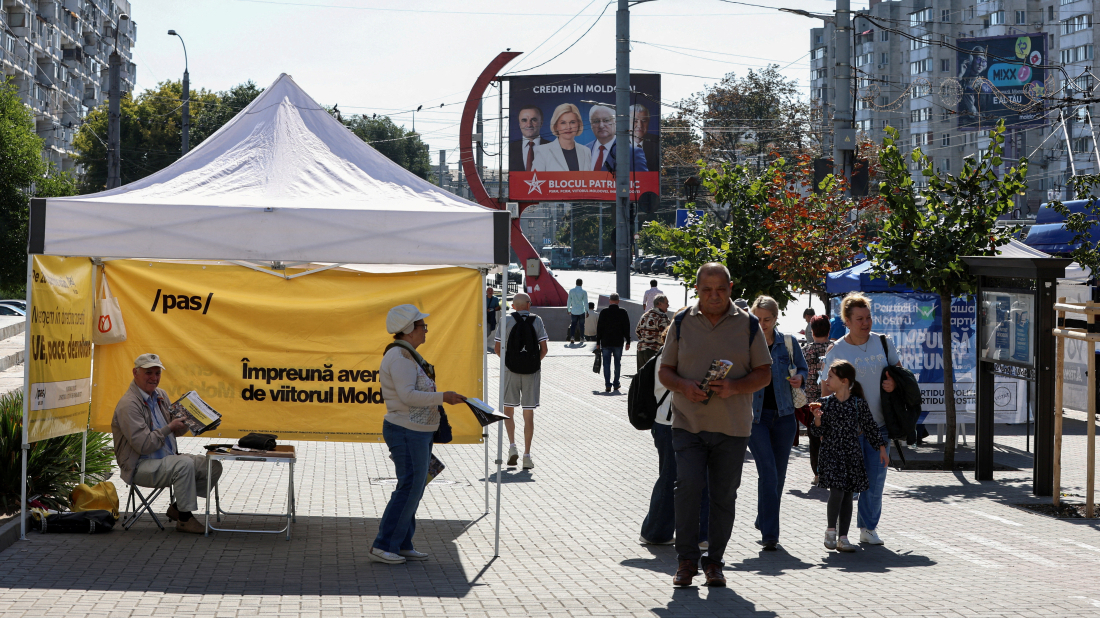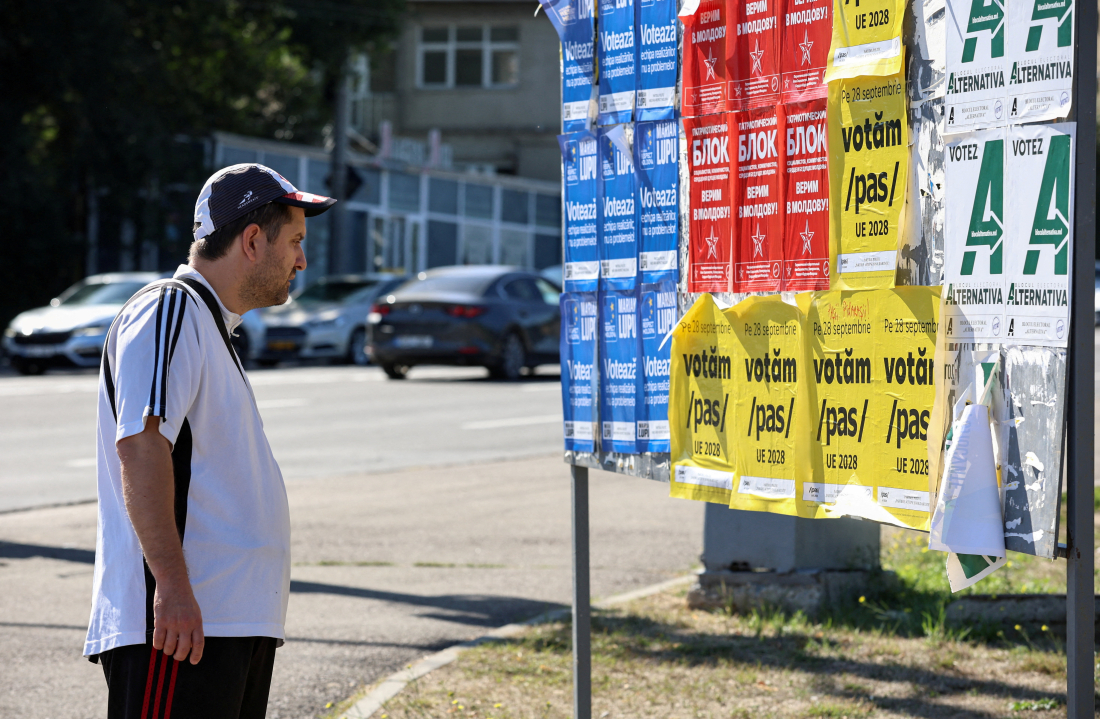live U.S. confirms troop deaths: All the latest news on Middle East conflict
The widening war between Iran, U.S. and Israel is leaving civilians and soldiers caught in its wake. Thousands are stranded across the Gulf, flight...

Moldova holds a high-stakes parliamentary election on 28 September that could determine the fate of its bid to join the European Union, amidst what officials have described as a subversive Russian campaign to sway the vote and sabotage the effort.
The country of 2.4 million people has faced multiple crises since Russia's 2022 invasion of neighbouring Ukraine that have tested the pro-European government, which sees membership of the 27-member bloc as critical to breaking free from Moscow's orbit.
Recent polls suggest the ruling pro-European Party of Action and Solidarity (PAS) could struggle to keep its majority and may need to form a coalition in the 101-seat legislature.
Opposition forces such as the pro-Russian Patriotic Bloc and the nominally pro-European Alternative alliance are courting voters bothered by high prices, slow reforms and scepticism over closer ties with Europe.
“Yes, I will go to vote because it's necessary," said 40-year-old teacher Ana Stirbu, reflecting the mindset of many pro-European voters.
"This is about the future of our country, the future of our youth. We must decide the fate of our country, and I will choose the European path, because we have noticed changes since Maia Sandu came to power,” she added.
Moscow denies meddling, but disinformation continues.
“Russian propaganda has specific messages for specific categories of the population...” said Eugen Muravschi, researcher at WatchDog.MD.

Coalition could hinder European integration
Any coalition would likely complicate President Maia Sandu's push for EU by 2030. A 2024 referendum on EU membership only just cleared a 50% majority.
"If we have a coalition, you can forget swift European integration given the options for ... partners," said a former senior official, speaking anonymously to give a frank assessment.
Brussels has vocally backed Sandu and considers a pro-European Moldova, which applied for EU membership in 2022 alongside Ukraine, key to snuffing out Russian influence on its eastern flank.
In August, the leaders of France, Germany and Poland visited Chisinau to underline their support for the government's EU bid.
Sandu: 'European future in danger'"
Moldova has a Romanian-speaking majority and a large Russian-speaking minority, and political power has alternated for decades between pro-Russian and pro-European groups. Russian troops are stationed in a separatist region that broke from Chisinau's control in a brief war in the early 1990s.
Sandu has described the vote as Moldova's most consequential election ever. Addressing the nation on Monday, she said Russia was spending hundreds of millions of euros to sway the vote and recruiting hundreds of people to stir disorder.
"Today, with utmost seriousness, I tell you - our sovereignty, independence, territorial integrity, and European future are in danger," she said.
Moldovan police have stepped up searches in recent weeks into illegal party financing. On Monday, security forces arrested 74 people in sweeping raids over alleged Russian-backed efforts to stoke unrest. Officials said Russian intelligence was training Moldovan citizens in Serbia on protest tactics.
Patriotic Bloc co-leader Igor Dodon, a former president, said some members of his alliance were targeted.
"The criminal PAS regime is trying to intimidate us, frighten the people, and silence us," Dodon said in a statement.
Last month, it's reported that fugitive tycoon Ilan Shor, sanctioned by the United States and EU as an alleged Russian agent, openly offered Moldovans monthly payments of $3,000 to join anti-government protests.
Domestic woes
Voters will head into the election after years of economic malaise - largely from the war in Ukraine and an energy crunch sparked by Russian cuts to critical gas supplies.
Many voters remain focused on high inflation and slow progress on anti-corruption reforms.
Moldova, one of Europe's poorest countries, relies on expensive Romanian energy imports, with inflation still around 7%, leaving many voters frustrated.
"People don't see, in their daily lives, the benefits of EU accession," said Anastasia Pociumban of the German Council on Foreign Relations.
Meanwhile, corruption remains persistent and reforms in key areas such as the justice system have moved slowly.
The Kremlin is utilising the recent United States and Israeli military strikes on Iran to validate its ongoing war in Ukraine. Russian officials are pointing to the escalation in the Middle East as evidence that Western nations do not adhere to international rules.
Saudi Arabia’s state oil giant Saudi Aramco closed its Ras Tanura refinery on Monday following an Iranian drone strike, an industry source told Reuters as Tehran retaliated across the Gulf after a U.S.-Israeli attack on Iranian targets over the weekend.
U.S. President Donald Trump said the U.S. military has enough stockpiled weapons to fight wars "forever"; in a social media post late on Monday. The remarks came hours before conflict in Iran and the Middle East entered its fourth day.
Türkiye raised its security level for Turkish-flagged vessels in the Strait of Hormuz to Level 3 on Sunday (2 March). The development follows Iranian restrictions on shipping after U.S. and Israeli strikes and confirmation of Supreme Leader Ali Khamenei’s death.
China’s Foreign Minister Wang Yi has held talks with his Russian counterpart Sergei Lavrov following recent military strikes carried out by the United States and Israel on targets in Iran, as tensions in the Middle East continue to rise.
Strikes across the Middle East are intensifying, fuelling travel disruption, driving up global energy prices and forcing diplomatic missions to shut their doors.
U.S. President Donald Trump has said the United States has a “virtually unlimited supply” of munitions and is capable of sustaining military action indefinitely, as the conflict with Iran entered its fourth day.
The United Nations has called for an investigation into a deadly attack on a girls’ primary school in Iran, which Iranian officials say has killed more than 100 children. The U.S. has said its forces “would not” deliberately target a school.
U.S. first lady, Melania Trump chaired a UN Security Council meeting on children and education in conflict on Monday (2 March), a move criticised by Iran as hypocritical following U.S. and Israeli strikes that triggered a UN warning about risks to children.
Start your day informed with AnewZ Morning Brief. Here are the top news stories for the 3rd of February, covering the latest developments you need to know.
You can download the AnewZ application from Play Store and the App Store.

What is your opinion on this topic?
Leave the first comment